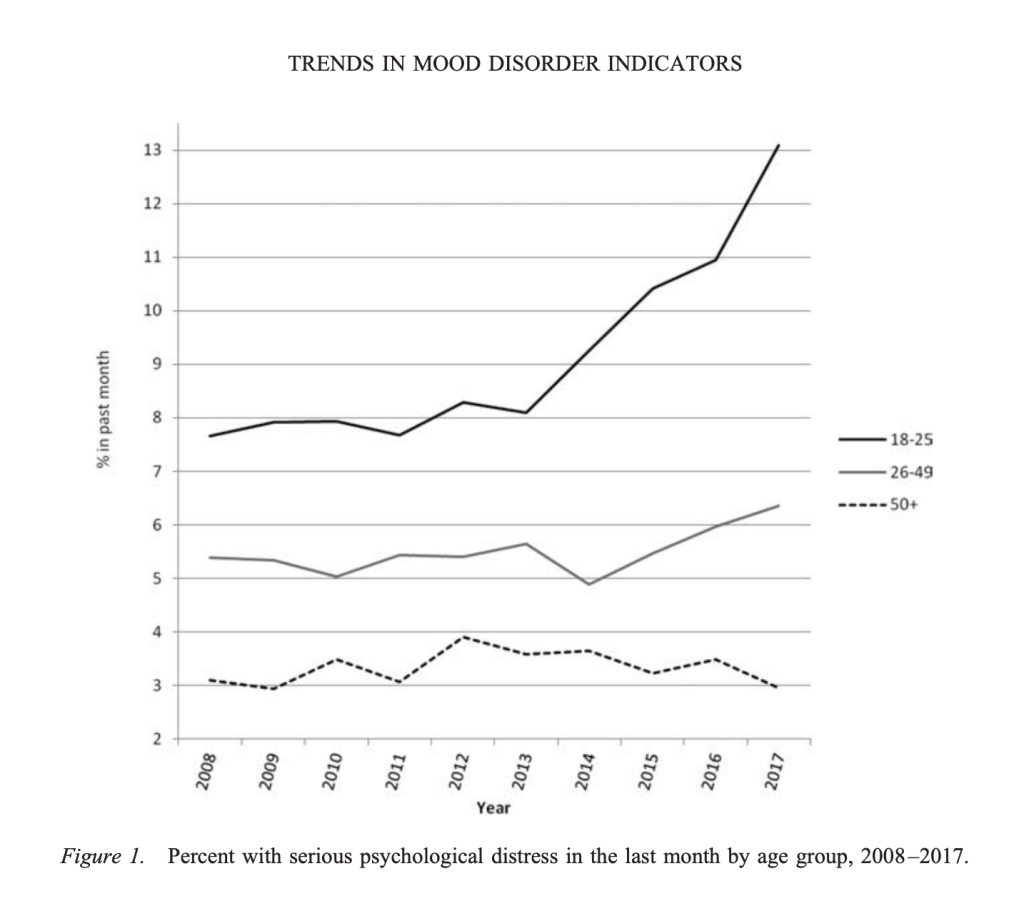
Our culture influences our feelings and how we express them. I used to think that the rates of depression are on the rise because suffering and unhappiness itself became medicalised, so people come to the doctor. Now, my culture-based theory has evolved*.
Some time after the Reagan/Thatcher ideas of absolute personal responsibility seeped through our economy, they also made their way into our psyche. The rise of positive thinking coincides with the advent of the neoliberal economy. If you think positively, good things will happen. Conversely, if good things didn’t happen, that’s because you didn’t believe in yourself enough, didn’t try hard enough, didn’t rise when you were knocked enough.
Byron and Keats wrote about their souls being dark and looked to nightingales as they indulged in their emotional pain. Even as late as the 1960s, T.S. Eliot got away with pretty dark musings and they were still considered art**. Radiohead may have gotten away with it with “Creep” in the 1990s. But who indulges in their sadness anymore?
What happens these days when you express negative emotions? Society says: you’re so negative. We can’t have these toxic attitudes in our lives. Goodbye. P.S. The matter is in your own hands – and you need to find where you went wrong, resulting in these terrible feelings. Now, fill yourself with some motivation and go out there again. Then we may talk to you once more.
To circumvent the problem of being left to deal with it all alone (impossible) or coming out and being called a loser, a complainer, to avoid being unfairly blamed, shamed and devalued, one reaches for the protections of a medical diagnosis. Humanity got backed into a corner, so it picked up the shield provided by the DSM***. Then one can talk about bad things that happened, the pain it caused and actually expect a bit of acceptance.
* There are many reasons why depression is on the rise – well described in the literature – and they are outside the scope of my little theory
** I would have liked to invoke Virginia Woolf, Sylvia Plath, Amy Winehouse and Kurt Cobain, but their art is inevitably seen through the prism of suicide – which is kind of prejudiced if you ask me.
*** The Diagnostic and Statistical Manual of Mental Disorders
Thoughtful post. Appreciated.
LikeLiked by 2 people
I’m glad you found some use in it! And who doesn’t love to be appreciated 🙂
LikeLiked by 1 person
Very thoughtful post. Much appreciated.
LikeLiked by 1 person
I almost never get depressed but this year …
LikeLiked by 2 people
This year has been a special case. Wibbly wobbly. The DSM will probably have special headings for 2020.
LikeLiked by 1 person
We’ve had an extra dose of anxious news, loneliness and lack of distraction for sure!
LikeLike
Break it down further. Is the depression then based on illusory hope or on the rejection of illusory hope?
I certainly think your theory holds water. In the post-war era people have come to expect things that previous generations accepted were not at their reach.
LikeLiked by 3 people
Martin Seligman did a lot of work on this: if you feel helpless (“nothing I do makes a difference”), you’re at risk of depression. I think this helplessness can arise when you’ve lost hope or when things you want are so astronomical that you lose faith you will ever get there. I guess there is a sweet spot somewhere 🙂
LikeLiked by 1 person
I like to wallow in self pity. Does that count?
LikeLiked by 2 people
I guess this way you at least have one person who will listen to you 🙂
LikeLike
I have this unfinished post in my drafts folder, False Hope: Good or Bad? It’s been there for a year. Your post reminded me it’s still there. Thanks for that.
I’m still on the fence as to whether such sentiment is beneficial or detrimental. I’m sure it boils down to context and extent. Are you hopeful you’ll get that dream job, someday? Or is that delusional thinking and you should be satisfied where you are, doing what you’re doing and find peace in your station? (You remember Sisyphus and all that.)
I don’t have trouble thinking about the darkness of existence. Suicide? Good stuff. I think you generally missed our whole Dear Mudge / Dear Mole exchange over the last year or so, but much of it dealt with this topic of existentialism and fatalism and I KNOW you’re tuned into that whole thing (or used to be).
Should we embrace sadness, sorrow and despair, if only for a time, in order to flush it from our system? I’m down. Maybe there’s secret social groups that invite the distressed among us and revel in despondency… Or perhaps we should start our own?
LikeLiked by 2 people
My answer to your last paragraph is a resounding yes! I’ve mentioned Martin Seligman before – and he comes to mind when reading your comment. His work has answered a lot of those hope-related things for me. And please do publish your post 🙂
LikeLiked by 1 person